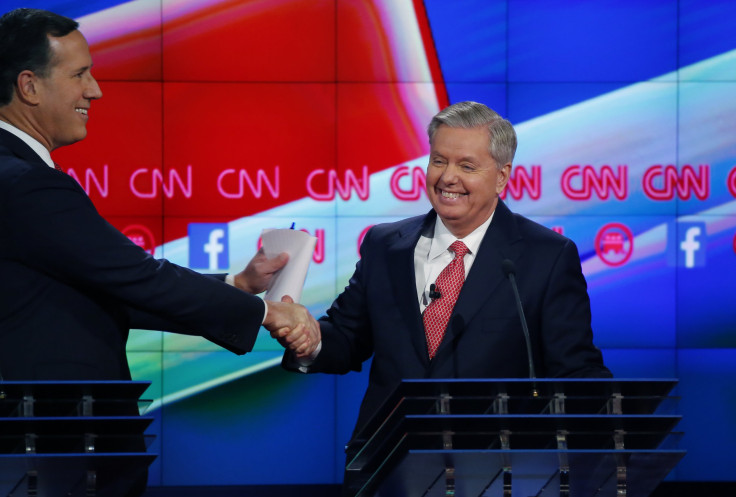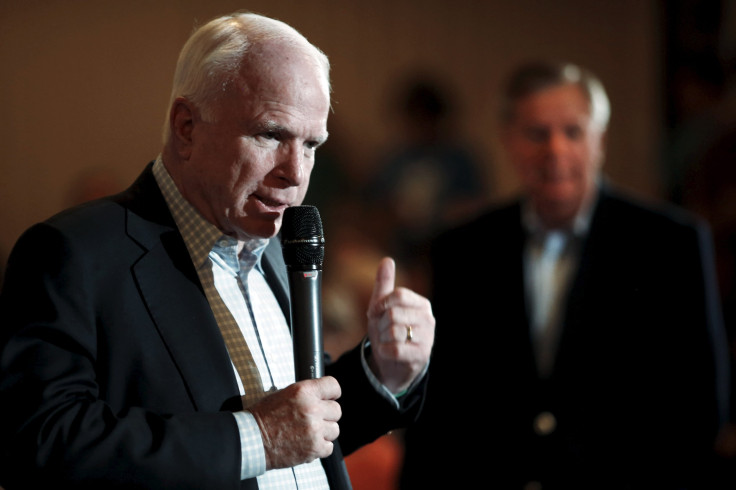Election 2016: With Lindsey Graham Out, Who Will John McCain Support In New Hampshire? Rubio, Christie Could Benefit

South Carolina Sen. Lindsey Graham’s exit from the race for the Republican presidential nomination may sound like a “so what?” moment for anybody who only focuses on national polls to formulate political predictions, but his departure frees up at least one supporter who could play an important role in the nation’s first primary state: John McCain. The Arizona senator who had closely aligned himself to Graham's White House bid can now lend his support to any other candidate he pleases, and that vote of confidence could be a powerful message to voters in New Hampshire, a state that has been good to McCain in the past.
“Even though the John McCain style is out of vogue in this election cycle, the one place he has a big impact is in New Hampshire,” Ford O’Connell, a political strategist who worked for McCain’s 2008 presidential campaign, said, referring to McCain's general reputation as a traditional and respectful politician (the 2008 general contest not withstanding). O’Connell said that Graham and McCain have a long history together, and that the South Carolinian also spent a lot of time on the 2008 campaign trail to help boost his Southwest colleague's odds.

With that said, it is still unclear who might win McCain’s favor now that Graham has called it quits. The 2008 nominee may not throw his weight behind anyone else before the New Hampshire primary occurs, O’Connell. Instead, he’ll likely wait it out while commenting on their specific policy proposals. If there’s anyone who McCain seems most likely to agree with – and it is definitely possible he could still make a last minute decision in the week between the Iowa caucuses and New Hampshire to tip the scales against Donald Trump – it would likely be one of two candidates who have been rising recently in polls.
“I promise you that, whoever he backs, it will not be Donald Trump,” he said. “I see McCain weighing in on issues, but, you know, if you had to look: I think [New Jersey Gov. Chris] Christie and [Florida Sen. Marco] Rubio are likely.”
Trump, the national front-runner in the 2016 Republican nominating season, came under fire in July after he questioned the war hero status of McCain, who was a prisoner of war in North Vietnam. McCain’s service in the military has been formative to who he is as a politician, and he is widely seen as one of the most trusted GOP voices when it comes to national defense and security. Two-thirds of New Hampshire voters say that both of those factors are their top concerns going into 2016.
Plus, it’s that military focus that helped McCain to pull off the rare feat of winning New Hampshire twice -- once in 2000 and then again in 2008. In the most recent poll of New Hampshire GOP primary voters, national security and terrorism were identified as the most important issue for voters there. The issue has become a major national concern lately, and New Hampshire voters often put it at the top of their lists of concerns because of a military base in the state.
With that in mind, supporting Christie or Rubio seems likely, and both seem well positioned to perform well in the Granite State. Rubio, who is tied for second in the state at 12 percent of averages of polls, has made foreign policy a central point in his campaign. Christie, who has seen his political stock in the state rise sharply since the terror attacks in San Bernardino and Paris, has refocused his campaign on his tenure as a federal prosecutor during the Bush administration when he prosecuted terrorists. He currently receives 11.3 percent of the GOP vote in New Hampshire.
© Copyright IBTimes 2025. All rights reserved.






















